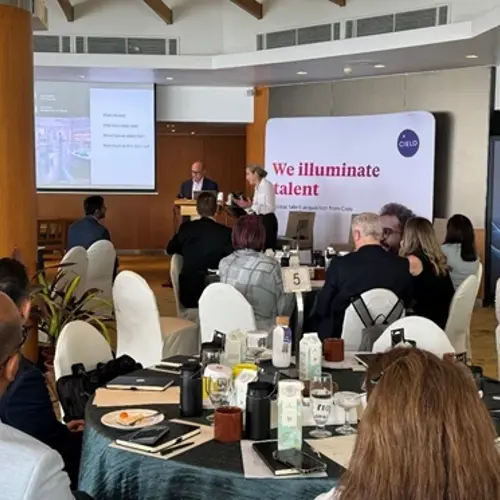Talent acquisition leaders need agile and flexible strategies to meet ever-evolving expectations and deliver results.
Recently, bright industry minds came together to generate future-forward solutions to do just that. Over 70 prominent TA leaders attended a series of global roundtables in Singapore, London, New York, and Chicago to exchange ideas on effectively attracting and retaining talent.
Attendees dove into recent research findings, gained deeper insights into underlying issues, and collaborated on ways to advance TA strategies.

Artificial Intelligence’s potential for streamlining recruitment processes generated a tremendous buzz during the interactive discussions. But realizing the value of this technology at scale calls for enterprise-wide change. Since AI and automation can effortlessly perform time-consuming recruitment tasks, companies are now placing greater emphasis on skills and experience than educational backgrounds or degrees.
Employment trends
More than 78% of CEOs report being highly disrupted in recent months. Senior executives in the U.S. are faring better, where workplace woes are declining. According to Douglas Tsang, partner at AlixPartners, the main disruptors are “demographic decline while salary, workplace flexibility, and diversity, equality, and inclusion (DEI) are influencing growing talent gaps.”
The most significant workforce issues executives face are:
- the inability to find talent
- finding a sufficient budget for technology and AI
- effectively managing employees in a remote or hybrid setting
- attracting and retaining a diverse workforce
Companies must change their recruitment, training, and retention strategies to address these challenges and continue reaching talent goals.
By the numbers
According to Cielo’s “Innovation in flux and the future of HR” report from 2023:
EU unemployment
Unemployment in the EU is decreasing (down from 6.5% at the end of 2020 to the current 5%).
U.K. employment rate
Unemployment rates are higher while overall employment is gradually recovering – it remains 2% below levels seen before the pandemic (75.5% compared to 77.5%).
EU employment rate
Employment rate has recovered and exceeds pre-pandemic levels (75.5% vs 73%).
Job availability is declining since employers are more selective with skills and team size requirements. Despite the challenging labor market conditions, businesses are still actively seeking key talent to meet their needs.
Amanda Dew, an international TA leader who attended the Singapore roundtable, commented:
The 25-year ‘war for talent’ is about to go into overdrive as talent scarcity intensifies and skills-based hiring takes center stage ... stand by – we'll be in hot demand again soon!
Dealing with disruption is about more than acquiring the right tools and technology – it’s adapting to meet talent’s changing and evolving needs. In the current market, employees are selective about who they work for and how they want to be employed. Many are “trying out” companies as independent contractors versus tethering themselves permanently – a challenging dynamic for employers who prefer pre-pandemic working styles and arrangements.
More reboot, less robot
The AI phenomenon – most notably the rise of generative AI tools like Chat GPT – featured strongly at each event. “AI is no longer a concept of the future. It’s a present force having notable impacts on all facets of business,” says Marissa Geist, CEO of Cielo.
AI is reshaping the skill set required in the job market, with a greater emphasis on AI development, management, and interpretation. Prompt engineering, machine learning operations, and electrotechnology engineering are the top three new skills.
In HR and TA, AI can improve the efficiency and productivity of roles across industries. It’s already streamlining candidate sourcing, resume screening, and initial interview scheduling. Generations that grow up in a digital and AI-centric world will further drive the integration of AI into HR and TA processes.
In one panel discussion, the state of the global economy and the challenges presented by external markets took center stage. Panelists explored how these obstacles push business leaders to seek opportunities through HR and TA strategies.
“Every year, we’re asked to do more with less. AI could be an exciting edge since it’s a complementary, not competitive, technology to empower human beings to work better and smarter,” Geist added.
Preparing for change
Over the next three years, remote work and employee experience will continue to shape the business landscape. And it’s vital to prepare for this change by prioritizing employee well-being, including mental, physical and financial health.
Companies must seek agile professionals who align with overall business goals – because they’re instrumental in driving success during times of change. Understanding the challenges of effectively utilizing technology with a remote workforce is also necessary, making strong leadership crucial. By investing in leadership development, organizations can ensure their technology and resources yield the desired results.
As the business landscape evolves, opportunities arise for more creative, flexible and tech-forward TA strategies. Building on the success of these roundtable events, Cielo is looking forward to hosting similar gatherings in 2024 and beyond to continue shaping the future of talent acquisition.
About the expert

Chief Executive Officer, Cielo
Marissa is the Chief Executive Officer of Cielo, the world’s leading global talent acquisition partner. She joined Cielo in 2015 as Senior Vice President of Global Operations, where she was instrumental in scaling Cielo’s delivery model.
LinkedIn connect